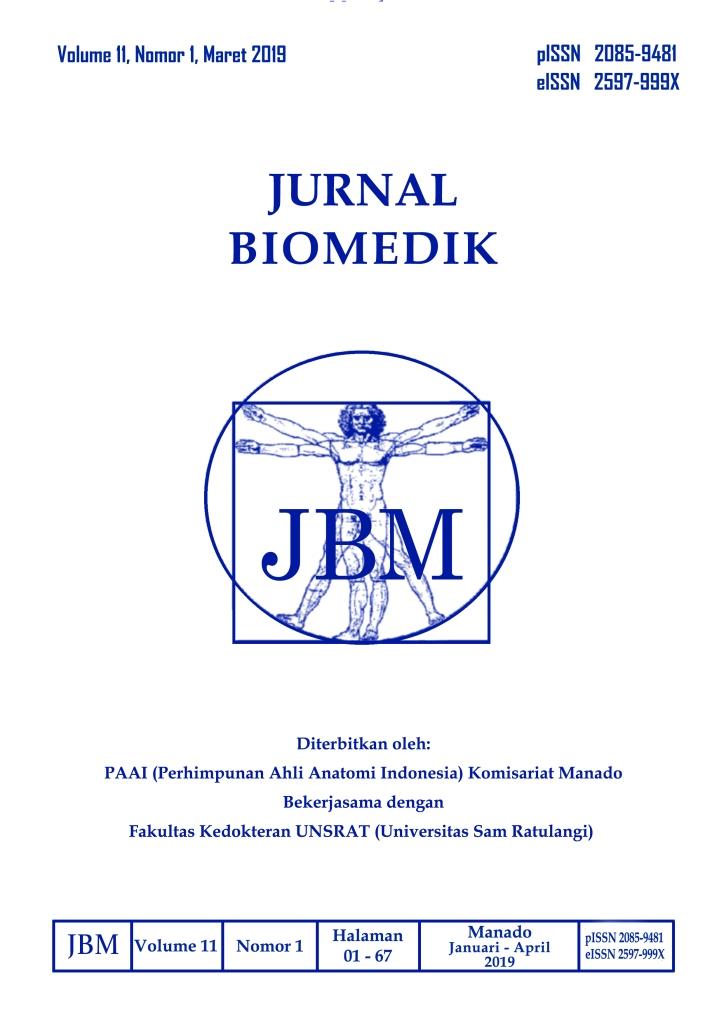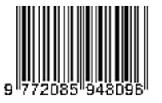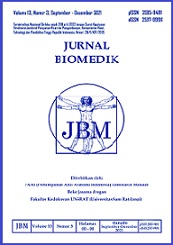Peningkatan Kadar Interleukin 10 Setelah Cedera Otak Berat akibat Trauma Berhubungan dengan Skor FOUR Rendah
DOI:
https://doi.org/10.35790/jbm.11.1.2019.23211Abstract
Abstract: Serum level of interleukin 10 (IL-10) and the FOUR score have both been suggested as predictors for the outcomes after severe traumatic brain injury (TBI). Studies are limited, however, on how they are related to each other. This study was aimed to assess the relationship between serum level of IL-10 and the FOUR score in patients with severe TBI. This was an observational study with a cross sectional design. The study was conducted on 25 severe TBI patients with FOUR score of 0-14 consecutively admitted at the the Emergency Surgery Installation of Prof. Dr. R. D. Kandou Hospital. Classification of the hemorrhage location (extra-axial, intra-axial, both), hemisphere (midline/diffuse, dextral, sinistral), and area (frontal, parietal, temporal, occipital, multiple) was established by using CT scans. Venous blood sample for IL 10 was performed less than 24 hours after trauma. Binary logistic regression was used to model the relationship of interest, with covariates selected through stepwise forward selection. The results obtained 25 patients dominated by males (84%), with median age 31. Mean IL-10 was 107.3 pg/ml (SD 16.2 pg/ml). Median FOUR score was 10, with fairly equal proportion in the category of high (FOUR score 0-7; 48%) and moderate (FOUR score 8-14; 52%) mortality risks. Final regression model included age and injury on temporal area (yes, no) as covariates for IL-10. Adjusting for these variables, the average patients had about 1.12 (95% CI 1.01, 1.25) times higher odds for worse FOUR scores (0-7, high mortality risk) in each pg/ml addition of serum IL-10. Conclusion: The finding indicates that increased IL-10 level is a potential alternative to the lower FOUR score for predicting worse outcome in patients with severe TBI.
Keywords: IL-10; FOUR score; TBI
Abstrak: Interleukin 10 (IL-10) serum dan skor FOUR disarankan sebagai prediktor luaran setelah cedera otak akibat trauma (COT) berat namun penelitian mengenai hubungan keduanya masih terbatas. Penelitian ini bertujuan untuk menilai hubungan antara kadar IL-10 serum dan skor FOUR pada pasien dengan COT berat. Jenis penelitian ialah observasional dengan desain potong lintang. Penelitian dilaksanakan pada 25 pasien dengan COT berat dan skor FOUR 0-14 secara berurut masuk ke UGD Prof. Dr. R. D. Kandou. Klasifikasi lokasi perdarahan (ekstra-aksial, intra-aksial, keduanya), hemisfer (garis tengah/difus, dekstra, sinistra), dan area (frontal, parietal, temporal, oksipital, multipel) ditetapkan dengan CT scan. Sampel darah vena untuk pemeriksaan IL-10 diambil kurang dari 24 jam setelah trauma. Regresi logistik biner digunakan pada model untuk hubungan ketertarikan dan kovariat stepwise forward. Hasil penelitian mendapatkan 25 pasien didominasi oleh laki-laki (84%), median usia 31 tahun. Rerata IL-10 107,3 pg/ml (SD 16,2 pg/ml). Median skor FOUR 10 dengan proporsi berimbang pada kategori tinggi (skor FOUR 0-7; 48%) dan sedang (skor FOUR 8-14; 52%) risiko mortalitas. Model regresi akhir termasuk usia dan cedera area temporal (ya, tidak) sebagai kovariat untuk IL-10. Rata-rata pasien memiliki sekitar 1,12 (95% CI 1,01-1,25) kali peluang lebih tinggi untuk skor FOUR yang lebih buruk (0-7, risiko kematian tinggi) pada setiap peningkatan 1 pg/ml kadar IL-10 serum. Simpulan: Temuan ini menunjukkan peningkatan IL-10 sebagai alternatif potensial terhadap skor FOUR yang lebih rendah untuk memrediksi hasil yang lebih buruk pada pasien dengan COT berat.
Kata kunci: IL-10, skor FOUR, COT
Downloads
Published
Issue
Section
License
Penyunting menerima sumbangan tulisan yang BELUM PERNAH diterbitkan dalam media lain. Naskah yang masuk dievaluasi dan disunting keseragaman format istilah dan cara penulisan sesuai dengan format penulisan yang terlampir dalam jurnal ini.
Segala isi dan permasalahan mengenai tulisan yang yang diterbitkan dalam jurnal menjadi tanggung jawab penuh dari penulis.







